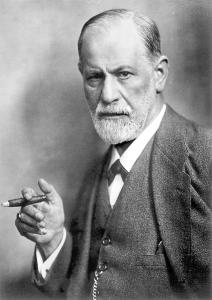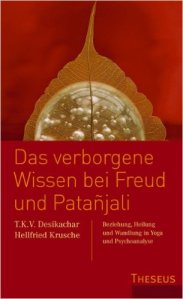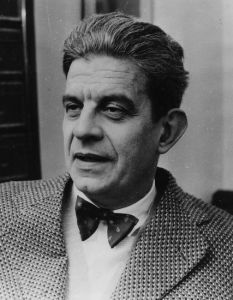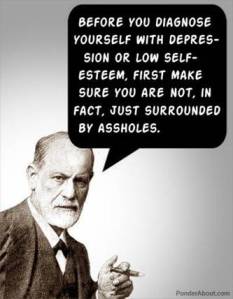Our new Person of the Week is the Austrian neurologist Sigmund Freud (1856 – 1939).

I’m sure that his name is best known to everybody and that it’s also common knowledge that he is considered to be the father of psychoanalysis, i.e. all those theories and techniques meant to treat psychopathology through a dialogue between the patient and his/her analyst.
If nowadays psychoanalysis/psychotherapy is an accepted and quite obvious way of dealing with psychological disorders, back in Freud’s day that wasn’t the case at all. Most patients with mental disorders were just considered to be mad and “put away”, nobody would have come up with the idea of listening to what psyhotic or hysteric patients had to say. Freud’s approach was in fact revolutionary and the influence of his studies on society is still alive up until these days.
In my last post we talked about Edward Bernays, Freud’s nephew whose story was portrayed by Adam Curtis in his documentary movie “The century of the self”. Bernays – the father of modern Public Relations – took his uncle’s theories and applied them to the field of advertising in order to sort of manipulate consumers’ decisions and boost the expansion of mass consume markets in the 1930s in America.
But that’s not the reason why I choose Freud as Person of the week.
Last weekend I attended a lecture about Psychoanalysis held at my yoga studio in Berlin (https://www.yoga-vidya.de/center/berlin/start/) by a Greek-born woman who is a psychoanalyst but also a yogin.
I was actually quite surprised that my yoga studio would offer a series of lectures on this topic – even though I already read a book which was a sort of dialogue between a psychoanalyst and a yoga practitioner and I knew that – even if there are of course differences in their approach – both disciplines aim at the same: self-discover and transformation.

The first evening was a kind of introduction to the whole topic and of course Freud’s theories played an important role in the discussion. But actually the psychoanalyst who held the lecture was a firm supporter of Jacques Lacan‘s theories, a French psychiatrist who developed Freud’s ideas and concepts.
 Jacques Lacan (1901 – 1981)
Jacques Lacan (1901 – 1981)
I never heard of him before and it’s only since last Friday that I started reading something about him. I was tempted to make him our new Person of the week, but since he seems to have quite controversial views which are also battled within the psychoanalytical movement, I thought I’ll wait until the end of the 10 lectures to form an opinion about him.
The only thing I’ve understood listening to our lecturer and asking her question is that there seem to be very harsh discussions and divisions in views between followers of different psychoanalytical theories. For example, from the way she talked, I could sense that she as a psychoanalyst didn’t at all have an high opinion about psychotherapists. But please don’t ask me why! I thought that everyone was more or less using the teachings of Freud to cure patients, but it looks like it’s not that simple.
There are a lot of different approaches and also the goals of treatment are quite different. Even if she said that someone needs to have symptoms to start a psychoanalysis (up until now I always thought that everybody could have analysis), our lecturer even refused to consider the word therapy as the right one. In her view analysis is way more than a simple therapy to reduce the symptoms of a certain disorder, but it sounded like more a global understanding of what life is all about and of the own life story including the psychic heritage our fathers and mothers gave us on our way through life.
I probably need more time to get the whole concept, but from what I got it seems like in Lacan’s theory only traumas are real because they make us to what we are now. Usually we kind of live in a sort of imaginary world where we cultivate an illusive view of ourselves – which very much reminded me of what I heard in a yoga seminar I had last summer, in which a Vedanta teacher was explaining us the philosophical views of Vedanta (but even back then I didn’t get the whole point, it’s too damn complicated).
According to Lacan (or what I got of it) only with psychoanalysis we can use the language as a symbol to get from the realm of imagination to reality. Psychoanalysis can in a certain way be seen as a yoga of language. Lacan considered language to be strongly related to the unconscious and saw it as a way for men to express their desire and obtain freedom. He was also influenced by poetry – especially the surrealist movement headed by Éluard and saw his patients as expressing a certain form of poetry.
Lacan was certainly one of the first to challenge the common beliefs in psychiatry in the 1970s and is considered to be a leading figure in the Anti-psychiatry movement. If you are interested read this very short paper giving an overview over the “Rise and Fall of Anti-Psychiatry”: http://pb.rcpsych.org/content/pbrcpsych/19/12/743.full.pdf
On this topic I also recommend the very sad but touching movie “Family Life” (1971) by one of my favourite British directors, Ken Loach. He picked up the topic of schizofrenia and the struggle patients suffering from this disease had to go through and the distress this could cause within their families but also showing how the bureaucracy of the British NHS made life hard to psychiatrists who tried to apply alternative methods for curing mental disorder and treating patients in a more human way.
Here you can see the whole movie on YouTube: https://www.youtube.com/watch?v=sgHSYT2jcgo

Ok, as you see, I talked about a lot of things but very little about Freud. But it looks like the shadow of this grumpy Austrian doctor is following us even almost 80 years after his death!
Sometimes I wished all this whole psychoanalysis stuff wouldn’t be so complicated, but I admit that during the lecture I attended I found it very fascinating to listen to this woman raising questions about life and the very nature of our human existence. Questions that in one way or another affect all of us and that everyone of us at a certain point in life will be faced with. (For example one of those questions was: why do I have of all the fathers just this father? and what does that mean for me and my life?)
In the end it may seem as if all sounds like very abstract philosophy and it’s certainly Freud’s biggest merit to have made questioning our own life a way of treating our little or bigger neurosis, psychological problems and troubles. In the end you don’t even need to be “mad” to be able to relate to the philosopical stuff Freud is talking about.
But sometimes, instead of worrying too much about too big questions it’s probably good to carry on with some more practical advice. I’m not even sure if this is a real Freud quote, but in any case it’s very effective!
